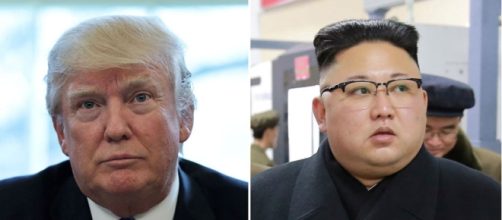"I'd be honoured to meet Kim Jong-un," says Trump
U.S President Donald Trump on the campaign trail had stated that given the chance he would have a go with talking north korean leader Kim Jong-un out of his countries nuclear pursuit, saying he thought he had a 10% to 20% chance of actually convincing him to do it. It seems now that he's not only in a position to do it but also he still feels the same way concerning this issue.
On Labour Day Monday, in an interview with Bloomberg,“If it would be appropriate for me to meet with him, I would absolutely, I would be honoured to do it,” “If it’s under the, again, under the right circumstances.
But I would do that.” The White House Press Secretary Sean Spicer later specified on those "right circumstances," by stating "clearly conditions are not there right now” for a meeting. He said, “we’ve got to see their provocative behaviour ratcheted down.”
North Koreas reaction and denuclearization history
North Koreas Foreign Ministry on Monday reacted to the Presidents conditions by saying the country will speed up measures to bolster it's nuclear program "at the maximum pace." This shouldn't be taken lightly keeping in mind that no high-level government representative apart from then-Secretary of State Madeleine Albright who in the year 2000 met with Kim's father Kim Jong II has ever met with a North Korea Leader ever since the armistice ending the Korean War in 1953.
And ever since 2011 when Kim Jong-un took power, he has not left the country and has to stay there and be vigilant since there are not only external threats but internal threats too. Analysts propose leaving North Korea, no matter the length away could expose him to possibilities of a coup from his opponents in the military or Pyongyang's elite. The denuclearisation odds also seem morose at best since starting from Kim's predecessors they were all hardly accessible or cooperative in fact over a course of over two decades; six-nation talks, bilateral negotiations, food aid and UN sanctions all have failed to deter the Kim Dynasties quest for nuclear capability.
Security concerns and measures being employed
In the first 100 days in office Trump has most definitely had a headache, maybe even a migraine from North Korea's national security threat. With Kim's regime steady on the course of nuclear weapon development and ballistic missile tests, despite international condemnation and sanctions, with military analysts believing that the North could just develop a nuclear-tipped ballistic missile that could reach the U.S mainland as soon as 2020, still in time for Trumps current administration I might add.
Seeing as how this is a top priority, Trump sent an Armada towards the Korean Peninsula as a show of force meant to deter the North, though the Korean's don't seem to be taking the hint and are actually taking it as an act of aggression and have given threats against the U.S in case they try something when the armada reaches the peninsula.
The U.S is proactive still with its defensive measures, having talks with China for help against the North Koreans, and also not forgetting the South Koreans, who in July Washington and Seoul agreed to have a missile defence system called the Terminal High Altitude Area Defence (THAAD) battery deployment in response to a series of missile tests by the North Korean's. The system became operational in South Korea on Monday, with the reported capability of initial intercept, a move which has angered China.
As I said in my first article about the U.S and North Korea, I am hopeful for a peaceful solution to all this, and with the willingness of talks, gives my hope strength. Peaceful methods do deserve a chance, hats off to President Trump for that move.


